International Day of Women and Girls in Science!
International Day of Women and Girls in Science!

International Day of Women and Girls in Science!
On Saturday 11th February, we are celebrating International day of Women and girls in Science! This day is an opportunity to celebrate and promote equal access to science for women and girls.
Why this Day is Important
The purpose of International Day of Women and Girls in Science (IDGWS) is to bring everyone forward for sustainable and fair development in society. The international day allows us to celebrate women’s achievements in science and places the necessary focus on ensuring girls are equally equipped with the skills necessary to enter a career in STEM.
This year commences the 8th year of International Day of Women and Girls in Science and aims to particularly focus on the role of women and girls in science in relation to the Sustainable Development Goals (SDGs). As Gender equality has always been a fundamental issue for the United Nations, the empowerment of women and girls will make a vital contribution, not only to economic development, but also across all the Goals of the 2030 Agenda for Sustainable Development. In doing so the IDWGS aims to connect women and girls in science to the international community, strengthening connections to science, society and the development of strategies aimed towards the future.
*Click the individual photographs for their full interview*
International Day of Women and Girls in Science!

International Day of Women and Girls in Science!
On Saturday 11th February, we are celebrating International day of Women and girls in Science! This day is an opportunity to celebrate and promote equal access to science for women and girls.
Ahead of the 11th, we have interviewed five influential Women who fulfil STEM based roles across Randox Laboratories. They have shared their experiences and thoughts on Women and girls in the science industry.
Our fifth interview is with Marketing Manager, Lynsey Adams.
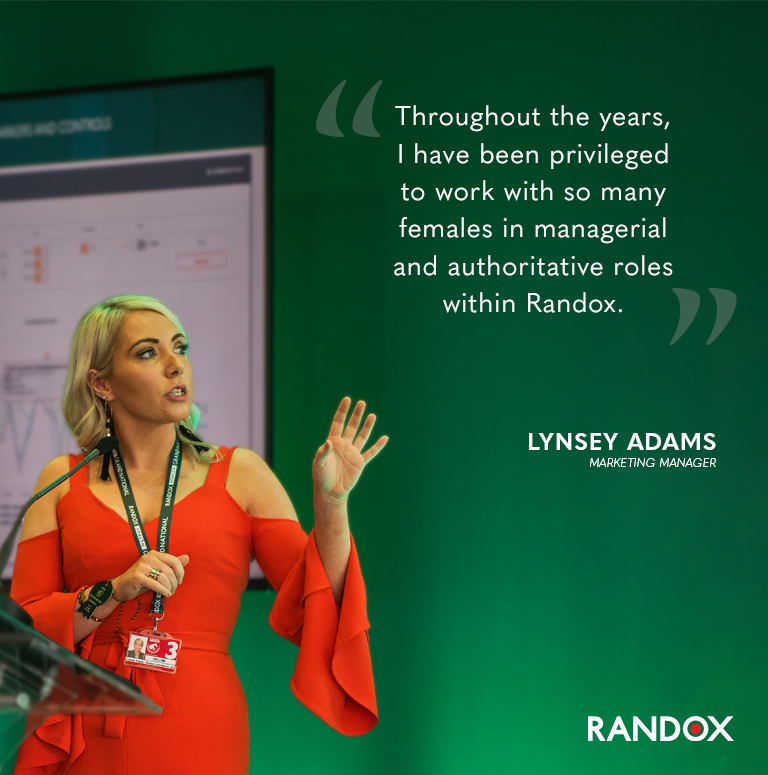
Why did you pursue a career in STEM?
I have always been interested in biology and what makes us unique. For that reason, I chose to study Genetics at Queens University Belfast. I have been lucky enough to work in the life sciences industry ever since.
What is your role in Randox and how long have you worked in the company for?
When I first came to Randox 15 years ago, I started off in Technical Support. I then progressed into the Marketing department and worked my way up to where I am today, to be the Head of Marketing. My role predominantly involves Marketing our scientific product ranges as well as B2C product offerings and sponsorships. Having a background in science has helped me to excel in my Marketing role and I am fortunate to be able to have the opportunity to do both the things that I enjoy and am passionate about.
What change have you seen for women in science over the years?
There has been an increase of women in STEM in general, whether that be more females studying STEM related subjects at university or exploring a career in STEM. Throughout the years, I have been privileged to work with so many females in managerial and authoritative roles within Randox.
Have you found it harder or any different going into your career in science as a woman?
Throughout the years I have been fortunate enough to have female teachers and lecturers provide crucial STEM related education who encourage females to pursue a career in STEM. During my working career I have experienced the same opportunities as other colleagues and seen an increase in women exceling in science.
How do you think we can encourage more women to go into the science industry?
Awareness of the varied career paths available within STEM related industries would be beneficial. The availability of work experience, placement, apprenticeship and graduate programmes like those offered at Randox helps to expose both males and females to the many exciting opportunities in the field.
If you have one piece of advice as a woman starting out the STEM industry, what would it be?
STEM is an equal playing field, so have confidence in your own ability and intelligence to get to where you want to be.
For more information, please contact Market@randox.com
International Day of Women and Girls in Science!

International Day of Women and Girls in Science!
On Saturday 11th February, we are celebrating International day of Women and girls in Science! This day is an opportunity to celebrate and promote equal access to science for women and girls.
Ahead of the 11th, we have interviewed five influential Women who fulfil STEM based roles across Randox Laboratories. They have shared their experiences and thoughts on Women and girls in the science industry.
Our fourth interview is with Head of RCLS Quality, Emma McGoldrick.
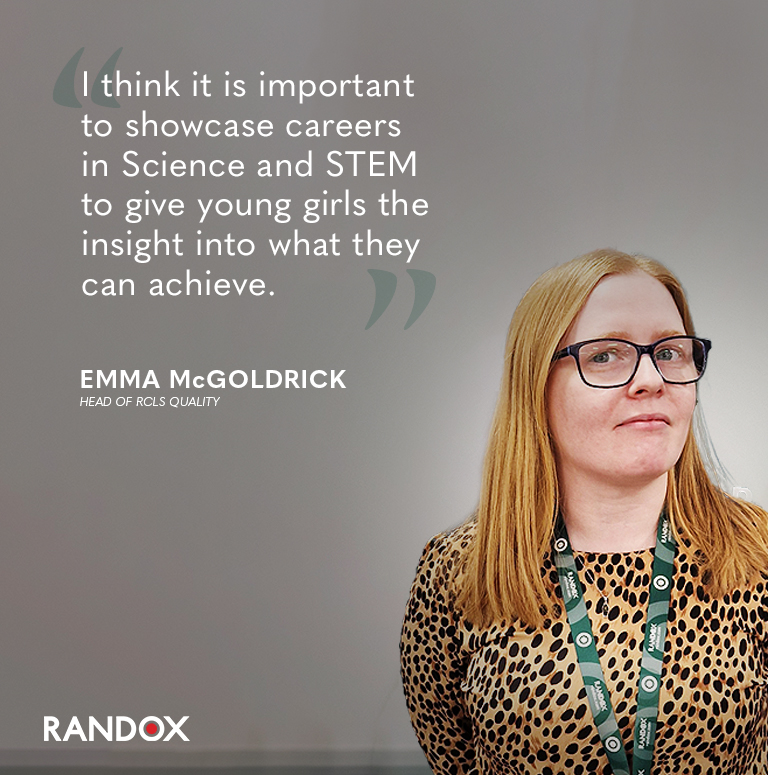
Why did you pursue a career in STEM?
I have always been interested in how things work. I enjoyed Maths and Science at school and chose to study Biomedical Science at university because it gave an overview of different areas of science and had a lot of practical modules.
What is your role in Randox and how long have you worked in the company for?
I started in Randox in 2018 working in the RTS laboratory doing routine analysis. During the pandemic I moved across to RCLS and was involved in the Covid-19 testing as a PCR shift lead and eventually a Deputy Lab Manager. In 2022, when the testing demands were decreasing, I moved into the RCLS Quality Department and became the Head of Department.
The Quality Department are responsible for ensuring the validity of results that are sent out to our customers, allowing them to have confidence in our service. The Quality Department are also responsible for maintaining our accreditation status and applying for any new accreditations for new testing.
What change have you seen for women in science over the years?
Over the years I have seen an increase in the number of women, not only in science, but in positions of responsibility or authority.
Have you found it harder or any different going into your career in science as a woman?
I wouldn’t say I have found it more difficult as such but at times you can be very conscious of the fact that it can be a very male dominated field and as a result of that feel that you have to work harder or do more to be taken seriously.
Fortunately, in the course of my career I have had a lot of female managers and colleagues. In fact, out of pure circumstance my team is predominantly women which is quite nice to work in a very supportive environment.
How do you think we can encourage more women to go into the science industry?
I think it is important to showcase careers in Science and STEM to give young girls the insight into what they can achieve. It is important to support young girls in school and allow them to feel heard and encouraged that they can do whatever they choose without any undue pressure in adhering to societal gender roles. Outreach to primary school age girls as well as high school age girls and showing them the variety of careers available to them in STEM is an important step in encouraging more women to go into STEM.
If you have one piece of advice as a woman starting out the STEM industry, what would it be?
I would say to any women starting out in STEM to keep going and pursue their career path and not to be put off. There is plenty of room for women in STEM and they shouldn’t be afraid to take up space in the field.
For more information, please contact Market@randox.com
International Day of Women and Girls in Science!

International Day of Women and Girls in Science!
On Saturday 11th February, we are celebrating International day of Women and girls in Science! This day is an opportunity to celebrate and promote equal access to science for women and girls.
Ahead of the 11th, we have interviewed five influential Women who fulfil STEM based roles across Randox Laboratories. They have shared their experiences and thoughts on Women and girls in the science industry.
Our third interview is with Business Development Manager, Remy Patton.
Why did you pursue a career in STEM?
I was always interested in Biology and studied Biomedical Science at University in Edinburgh. During my degree I spent a lot of time in the lab, but after 4 years of studying I knew working in a lab environment full time wasn’t for me. I wanted a sales role, staying within the medical industry. After taking a gap year I applied for the Graduate Scheme at Randox. I have been given the opportunity to progress quickly in this role and now get the best of both worlds – engaging with customers, while also using my Scientific background.
What is your role in Randox and how long have you worked in the company for?
I am a Sales Manager, overseeing some of our European markets. I have been working at Randox for just over 3 years and am lucky enough to get the opportunity to travel internationally every month. While on work trips I visit current customers, build relationships with potential new customers, all while promoting our Randox Quality Control portfolio. Being in the field also allows me to see Randox products being used in real-life scenarios. Ultimately, the products we sell ensures accurate patient results, which is our number one priority.
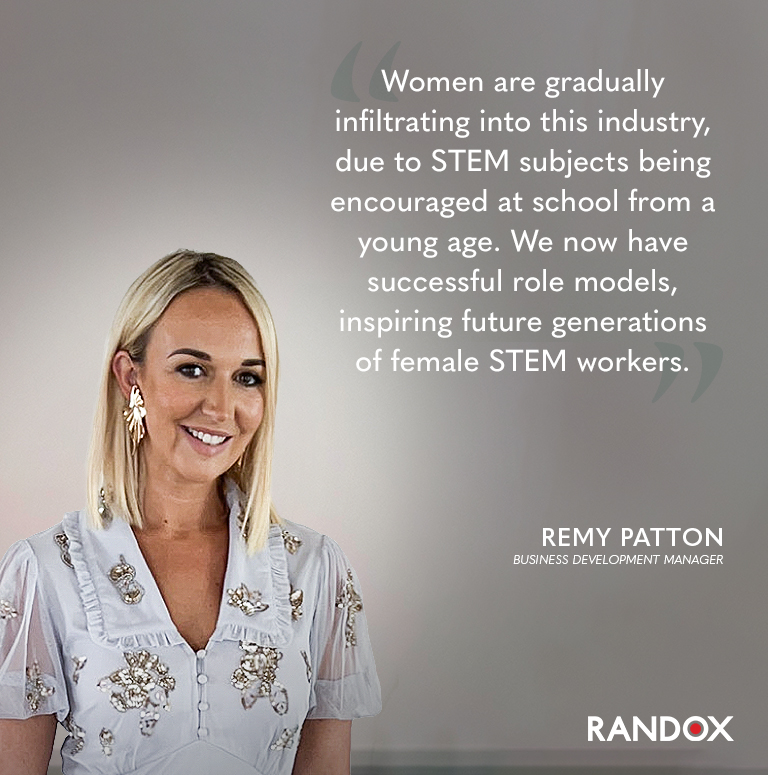
What change have you seen for women in science over the years?
Women are gradually infiltrating into this industry, due to STEM subjects being encouraged at school from a young age. We now have successful role models, inspiring future generations of female STEM workers. In Randox, we have career focused women working in many different departments, such as Manufacturing, Engineering and Logistics – which were once male dominated sectors.
Have you found it harder or any different going into your career in science as a woman?
In this role, I have never felt disadvantaged to be female and have actively been encouraged to progress in the company and further my career. I’ve had the same opportunities as my male colleagues and feel that I can provide the same quality of service to the company.
How do you think we can encourage more women to go into the science industry?
We can promote equal opportunities for both male and female candidates and make it clear that females are as successful in the science industry as males. We can also team up with local schools and universities to hold workshops, to show women exactly how many different opportunities there are to explore within science.
If you have one piece of advice as a woman starting out the STEM industry, what would it be?
My advice would be for women to believe in their abilities to succeed!
For more information, please contact Market@randox.com
International Day of Women and Girls in Science!

International Day of Women and Girls in Science!
On Saturday 11th February, we are celebrating International day of Women and girls in Science! This day is an opportunity to celebrate and promote equal access to science for women and girls.
Ahead of the 11th, we have interviewed five influential Women who fulfil STEM based roles across Randox Laboratories. They have shared their experiences and thoughts on Women and girls in the science industry.
Our second interview is with Lead Biomedical Engineer- Sarah Hamilton.
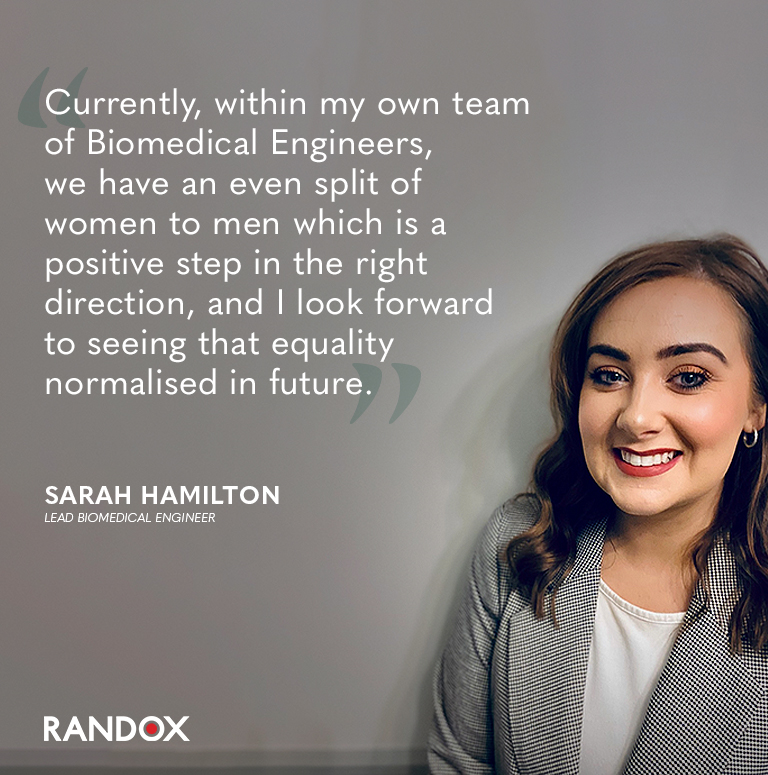
Why did you pursue a career in STEM?
At A-Level I studied Technology & Design, Biology & Chemistry. I always enjoyed the process of facing a problem scenario and working through design processes to form a solution. The problems I identified were always centred around healthcare issues. During A-Levels, I also had the opportunity to take part in the Sentinus Golden Crest Award, an initiative promoting STEM in schools. I went on to pursue a career in Engineering largely down to the great exposure I had to the industry during my time at school. Biomedical Engineering appealed to me most as it had the added aspects of applying biological/biochemical principles to technology in ways that improve healthcare provision and create products that directly impact quality of life. As part of my degree, I had an Industrial placement year, this experience was within Medical Device R&D where I had some amazing mentors who helped me see that Engineering R&D was definitely the correct career path for me.
What is your role in Randox and how long have you worked in the company for?
My role within Randox is Lead Biomedical Engineer within the Engineering R&D department. I started in 2017 having graduated from Ulster University as a Biomedical Engineer. During the last 6 years I have progressed to a Team Leader role. In this role I co-ordinate a team of 7 people from Senior to Placement Biomedical Engineers.
Within this team we work across multiple projects which are all in different stages of development. My main role is to plan and facilitate the completion of testing ranging from early prototype development through to Verification & Validation. The Biomedical Engineering role involves working within a multidisciplinary team of Mechanical, Electrical & Embedded Design Engineers, Software Developers & Testers and Scientists (Chemists & Physicists). In Engineering, we also work alongside Assay Development Scientists and Lab Scientists. In doing so we ensure our product requirements are in line with user needs and performance is as expected.
What change have you seen for women in science over the years?
Comparing my time at school & university to now, there has been a noticeable change in the emphasis put on STEM careers. It is great to see employers from a variety of industries participating in more outreach programmes aimed at both primary, secondary and tertiary education levels, similar to the Sentinus Award which first got me interested in a STEM career. Many of my colleagues, and I, have participated in different events aimed at promoting careers in STEM. And I know many companies have diversity and inclusion programmes with aims of attracting more females into STEM roles at both junior and more senior levels. I feel that this has helped change attitudes of both woman and men from what was previously considered normal within STEM.
Have you found it harder or any different going into your career in science as a woman?
When I started as a graduate engineer, I was the only female in a team of 15 men, so, while I have found the industry still quite predominately male, I don’t believe this poses any setbacks for starting out in a STEM career or for career progression. Currently, within my own team of Biomedical Engineers, we have an even split of woman to men which is a positive step in the right direction, and I look forward to seeing that equality normalised in future. Overall, getting to work within a group of likeminded people who work together to solve multiple complex problems is extremely rewarding.
How do you think we can encourage more women to go into the science industry?
I think improving and promoting initiatives that provide exposure/insight into the STEM industry in schools is one of the best ways to inspire the next generation. It allows more girls to see the many different roles in the STEM industry which they might not otherwise have been aware of or considered pursuing.
If you have one piece of advice as a woman starting out the STEM industry, what would it be?
Have confidence to make sure you are heard.
For more information, please contact Market@randox.com
International Day of Women and Girls in Science!

International Day of Women and Girls in Science!
On Saturday 11th February, we are celebrating International day of Women and girls in Science! This day is an opportunity to celebrate and promote equal access to science for women and girls.
Ahead of the 11th, we have interviewed five influential Women who fulfil STEM based roles across Randox Laboratories. They have shared their experiences and thoughts on Women and girls in the science industry.
Our first interview is with Head of technical Services- Louise Lynn.
Why did you pursue a career in STEM?
I enjoyed science at school and it was an easy decision to continue science through to A-level. I went on to study Biochemistry at Queens University, Belfast and during my time there I heard about Randox. I applied for various jobs when I graduated, but Randox interested me the most and was most applicable for my degree.
What is your role in Randox and how long have you worked in the company for?
I am currently Head of Technical Services in Randox, overseeing the Global Technical Support and Applications Teams.
I have been working in Randox for almost 25 years! I started in the R&D lab during the development of our Liquid Enzyme reagents, and quickly moved into Technical Support. I have held various roles within Technical Support over the years and have seen many changes in that time. As a department we support the Randox Clinical products, dealing with enquiries, complaints and troubleshooting, as well as customer training. No two days are the same.
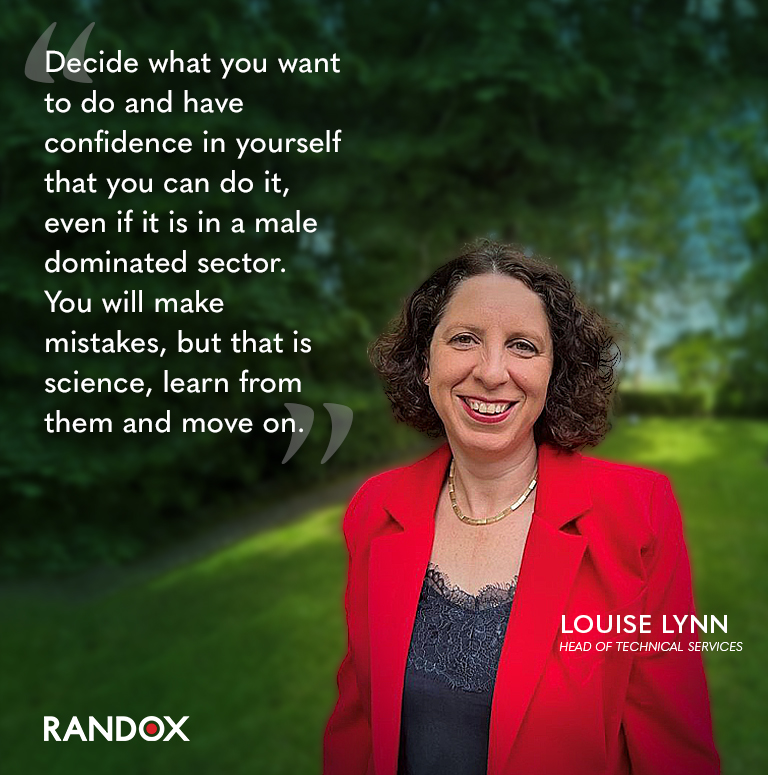
I enjoy dealing directly with the customers and building those relationships. Working in Technical Support has given me the opportunity to travel and visit labs globally which has been very interesting and allows you to see our products in use and is always a reminder that ultimately there is a patient depending on our products to manage their health.
During the pandemic I was also involved in setting up the Covid Customer Support Team which was one of the most challenging times in my career, but also a very positive experience.
What change have you seen for women in science over the years?
During my time at university and throughout my career I have worked alongside many females, however I have seen an increase in female engineers over more recent years, which is great to see in one of the more male dominated sectors of the business.
Have you found it harder or any different going into your career in science as a woman?
Throughout my career at Randox I have had both male and female managers. We have been very fortunate that everyone is given an equal opportunity within the company and we have always had females in senior management positions. At no stage in my career have I found being a female has caused me to struggle or consider changing my career path. I was also given flexibility when my children were young, but this did not prevent me from progressing my career once I was ready to do so again.
How do you think we can encourage more women to go into the science industry?
Female scientists and engineers going into schools and talking about what they do. Many young people don’t know what they want to do and getting their attention at an early age and hearing real life career stories first hand can have a huge impact.
If you have one piece of advice as a woman starting out the STEM industry, what would it be?
Decide what you want to do and have confidence in yourself that you can do it, even if it is in a male dominated sector. You will make mistakes, but that is science, learn from them and move on.
For more information, please contact Market@randox.com
